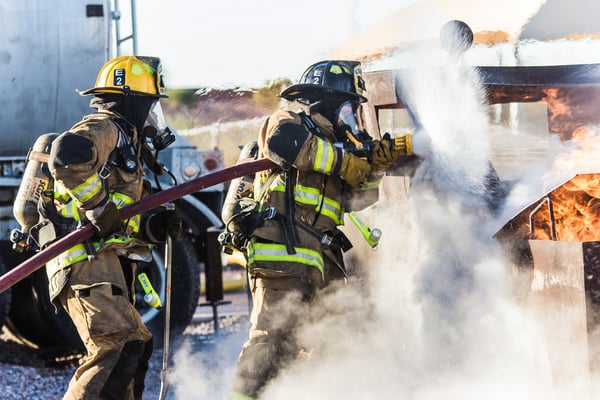

Firefighting Foam Linked to Cancer
New information has revealed that companies have sold unsafe firefighting foam to our first-responders for decades, despite the possible health risks to firefighters and military personnel.
Toxic chemicals known as Perfluoroalkyl and polyfluoroalkyl substances (PFAS) have been identified as carcinogenic and, in many cases, are still being used in firefighting foam.
Cancers and complications potentially caused by firefighting foam include:
- Kidney cancer;
- Pancreatic cancer;
- Testicular cancer;
- Prostate cancer;
- Bladder cancer;
- Liver cancer;
- Breast cancer;
- Leukemia;
- Lymphoma;
- Infertility; and
- Neuroendocrine tumors.
Firefighters who have been exposed to this foam and have later developed cancer may be entitled to substantial compensation through a firefighter foam lawsuit. We have an extensive dangerous and defective product practice that has enabled us to fight for those who were wrongfully injured. Click here for a free and confidential case evaluation.
What is Firefighting Foam?
Firefighting foam is formally known as aqueous film-forming foam (AFFF) and has been used since the 1950s to put out fires. The foam is effective in stopping fires because it creates a coating that cuts off the oxygen needed to fuel a fire. Chemicals known as Perfluoroalkyl and polyfluoroalkyl substances (PFAS) were, and in some instances, still are used to help extinguish flames.
Manufacturers have used the dangerous chemical known as PFAS to make firefighting foam for decades, and exposure to PFAS has now been linked to causing many different types of cancer. Most commonly, kidney cancer, testicular cancer, and pancreatic cancer.
It is important to note that some firefighters may have been exposed to a greater extent than others. While many municipal fire departments have stopped using firefighting foam that contains PFAS, military bases and airports throughout the country continue to use the cancer-causing firefighting foam routinely.
Firefighters who have served in the United States military are at a notably higher risk of PFAS exposure than others due to the firefighting foam’s prevalent use in training exercises and non-critical missions. The military is currently phasing out the use of PFAS.
Firefighters assigned to airports are also at a higher risk because airports required the use of the PFAS in firefighting foam until 2018.
Firefighting Foam Side Effects and Complications
Due to PFAS’s long-lasting nature, the firefighting foam does not break down and can remain in the human body for years, causing many side effects and complications. The most common and severe side effects of exposure to PFAS in firefighting foam include:
- Increased risk of cancer;
- Damage to the immune system;
- Fertility complications; and
- Impaired growth in children
The Centers for Disease Control and Prevention (CDC), United States Environmental Protection Agency (EPA), and the American Cancer Society (ACS) have all noted that certain PFAS might be linked to cancer in firefighters. Additionally, the EPA has classified PFAS as “emerging contaminants,” meaning they are believed to pose serious dangers to human health.
VB Attorneys Can Help with Your Firefighting Foam Lawsuit
Firefighters, civilians, and military personnel may be entitled to compensation if they have been diagnosed with one of the following: kidney damage (kidney cancer, chronic kidney disease, acute kidney failure), pancreatic cancer, testicular cancer, prostate cancer, leukemia, lymphoma, bladder cancer, or infertility.
If you or someone you know has been contaminated with AFFF and are now diagnosed with cancer or are suffering from other complications, it is crucial that you contact our legal experts at VB Attorneys as soon as possible. You may be entitled to compensation. Remember, you only pay when we win. To receive a free and confidential case evaluation, please complete this contact form or call our office at 713-224-7800.

